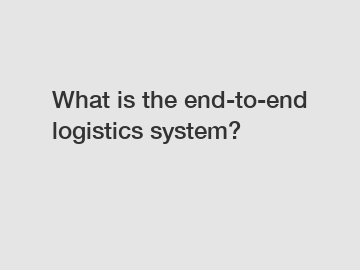What is the end-to-end logistics system?
What is the End-to-End Logistics System?
In today's interconnected global marketplace, having an efficient logistics system is crucial for businesses to stay competitive. One approach that has gained significant traction in recent years is the end-to-end logistics system. This system encompasses the entire supply chain, from the procurement of raw materials to the delivery of finished goods to customers. In this article, we will explore the concept of end-to-end logistics system and its importance in optimizing operations.
Overview of the End-to-End Logistics System.

The end-to-end logistics system refers to the seamless integration of all activities and processes involved in the movement and storage of goods from the point of origin to the point of consumption. It aims to eliminate bottlenecks and inefficiencies by ensuring that every step of the supply chain is connected and optimized. This system takes into account various logistical components, including transportation, warehousing, inventory management, and order fulfillment.
Primary Components of the End-to-End Logistics System.
1. Procurement: The first step in the logistics system is procuring the necessary raw materials. This involves sourcing suppliers, negotiating contracts, and ensuring the timely delivery of materials. Efficient procurement practices are essential for maintaining a consistent supply chain and avoiding production delays.
2. Transportation: Once the raw materials are acquired, transportation plays a crucial role in moving them to the manufacturing facility. This can involve various modes of transportation, such as trucks, trains, ships, or airplanes. The end-to-end logistics system optimizes transportation routes and modes to minimize costs and shorten lead times.
3. Warehousing: Warehousing is an integral part of the logistics system, as it provides a central location for storing and managing inventories. The end-to-end approach focuses on strategic placement of warehouses to ensure efficient distribution to customers. This reduces transit times and enables faster order fulfillment.
4. Inventory Management: Effective inventory management is essential to the success of the end-to-end logistics system. By using advanced inventory forecasting techniques and real-time data, businesses can optimize inventory levels, reduce carrying costs, and prevent stockouts. This ensures that customers receive their orders promptly while minimizing excess inventory.
5. Order Fulfillment: The final component of the end-to-end logistics system is order fulfillment. This involves processing customer orders, picking and packing products, and ensuring accurate and timely delivery. By streamlining the order fulfillment process, businesses can enhance customer satisfaction and improve overall operational efficiency.
Importance and Benefits of the End-to-End Logistics System.
Implementing an end-to-end logistics system offers various benefits for businesses:
1. Enhanced Efficiency: By eliminating silos and integrating processes, the end-to-end logistics system reduces duplication of efforts and streamlines operations. This leads to improved efficiency and productivity throughout the supply chain.
2. Cost Savings: The system optimizes transportation routes, reduces inventory carrying costs, and minimizes fulfillment times. This results in significant cost savings for businesses while maintaining high levels of customer service.
3. Improved Customer Satisfaction: With faster order processing and shorter delivery times, the end-to-end logistics system enhances customer satisfaction. Meeting customer expectations in terms of speed and reliability can lead to increased loyalty and repeat business.
4. Data Visibility and Analytics: The system provides real-time visibility into the entire supply chain, allowing businesses to track shipments, monitor inventory levels, and analyze operational performance. This data-driven approach enables informed decision-making and continuous improvement.
In conclusion, the end-to-end logistics system plays a vital role in optimizing the supply chain from start to finish. By integrating all aspects of the logistics process, businesses can achieve greater efficiency, cost savings, and improved customer satisfaction. Embracing this holistic approach is essential for staying competitive in today's fast-paced business environment.
For more information on how to implement an end-to-end logistics system for your business, please do not hesitate to contact us.
For more information, please visit paperless FBA Software, cross border ecommerce logistics software Pricing, parcel delivery software company.

Comments
0